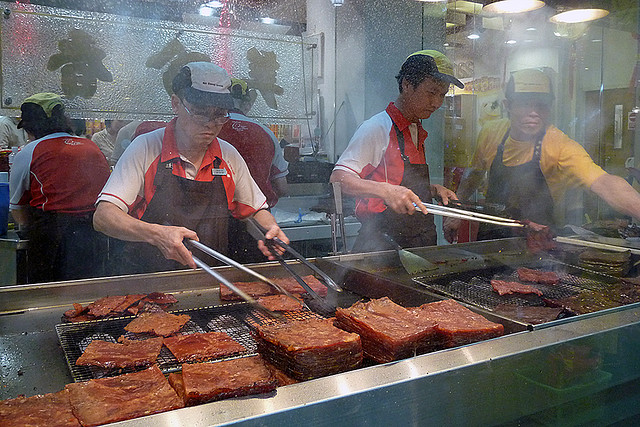“Equality in Singapore society is far from a reality”
September 22nd, 2013Singapore has achieved remarkable economic growth in its short history, but Aristle Tay, 19, a Commonwealth Correspondent from Singapore, says economic equality in its society is still a distant goal.
Rapid economic growth since its inception in 1965 has morphed my island home of Singapore into a protean cosmopolitan city with admirable standard of living for its inhabitants.
However, recent debates and writings by modern-era Panglosses and Cassandras make us question whether society has actually progressed as a whole.
Factors like our meritocracy system, increased demand for skilled workers and a progress-oriented culture are cited. Optimists counter the arguments with recent rising trends of government intervention and initiatives among Singaporeans. Personally, based on my observations, while it is undeniable that much effort has been placed to ensure equality for all, I will insist that this goal is simply not possible in my society.
Human capital is arguably Singapore’s the most prized and main resource. It is in this pragmatic view that Singapore adopted a meritocratic system after its separation from Malaysia. A meritocratic system is one in which one the most capable ones are allowed to climb the ranks.
While this system may seem equitable on the surface, it is also a strong barrier that prevents Singaporeans being on equal footings. It has prevented the disadvantaged from receiving equal opportunities to succeed. A classic example could be the promotion structure in the government sector where the brightest minds are given the chance to move up to managerial roles while those lower in terms of education and skills maintain their front line duties. The practical approach of deciding success based on pre-agreed merit will not benefit those that are not adept at battling on the playing ground. An equitable standing for all is not possible.
For Singapore’s greatly accelerated economic growth we thank the decision to embrace globalization. While that move has benefitted Singapore on a whole, it has also brought costs. One is the rise in wages of skilled workers due to an increase in the demand for them. On the other hand, there was a fall in wages of low-skilled workers due to an increase in their numbers.
This has resulted in a widening income gap that deters the latter from seeking a standard of living equal to that of the former.
Singapore has the presence of the rich and the powerful living fanciful lifestyles in big and expensive places while the poor struggle to tussle a living from those stony gods, Gog and Magog. Not all Singaporeans have actually received the same benefits. As such the inequality among Singaporeans will just keep growing.
Singapore has a progress oriented culture. A by-product is that while Singaporeans try to maximize their time and effort to gain ahead of their peers, some have become apathetic toward the disadvantaged. This has undoubtedly resulted in decreased support for the disadvantaged, which only serves to deepen the crevasse between Singaporeans. A recent trend of falling participation in special care centres and homes for the elderly as recorded by the National Volunteer and Philanthropy Centre unmistakably illustrates my argument. Singaporeans, pressurized by the daily activities of life, have held back from reaching out their hands to the disadvantaged. This will continue to ensure the unequal demographics of Singapore.
In recent times the Singapore government has intensified attempts to bridge the widening gap between the advantaged and the disadvantaged by ensuring that both groups have potentially minor differences in their standard of livings. Such initiatives include the income wage supplement policy whereby case vouchers are issued to the lower income groups, and various skills upgrading programmes for the low-skilled, supported by the National Productivity Fund. These policies try to alleviate the discrepancy among Singaporeans. It could be then said that with these measures in place, equality for all is a possible reality.
Furthermore, there has been an increase in the fraternity of certain groups of Singaporeans. This has resulted in the increased adoption of social enterprises that serve not only to help the disadvantaged but also to enlighten the wealthy to give to the needy. Such initiatives provide finances and consultation to the disadvantaged to better their lives. On the other hand, those with plenty are taught the value of giving to the less fortunate to ensure an equitable standard of living among Singaporeans. One example is the thought collective designed by the founders of School of Thought Tong Yee and Kuik Shiao Yin. Their programmes seek to educate individuals about the possibilities of chasing their dreams by working hard for them. These initiatives, though on a small scale, will go far in the long term to finally ensure equality for all in Singapore.
In conclusion, while there have been interventions from both the government and the people of Singapore, equality for all in Singapore is not likely, due to our need to priortise survival of our nation and the pervasive meritocratic culture. Therefore, I believe that equality in my society is far from a reality.
photo credit: chooyutshing via photopin cc
…………………………………………………………………………………………………………………
About me:
I’m an 19-year-old male Chinese who loves astronomy, adventurous challenges, running, and most of all, interacting with youths all around the world! Presently I am serving my two-year National Service in the Singapore Armed Forces.
I have always held the belief that arguments and debates, while meant to drive out flaws in our opinions, should serve to bind us together and not separate us. For united we stand, divided we fall.
…………………………………………………………………………………………………………………
Opinions expressed in this article are those of the author and do not necessarily represent the views of the Commonwealth Youth Programme. Articles are published in a spirit of dialogue, respect and understanding. If you disagree, why not submit a response?
To learn more about becoming a Commonwealth Correspondent please visit: http://www.yourcommonwealth.org/submit-articles/commonwealthcorrespondents/
…………………………………………………………………………………………………………………





